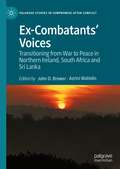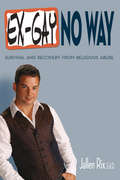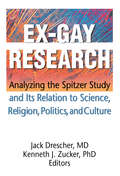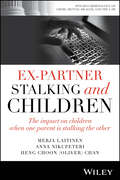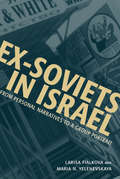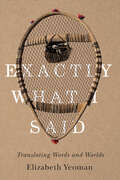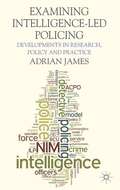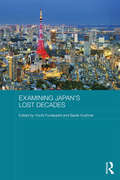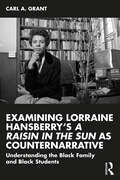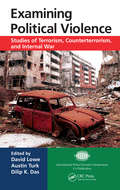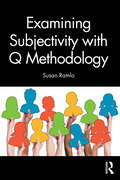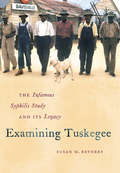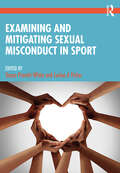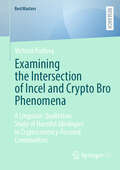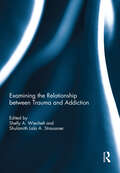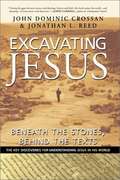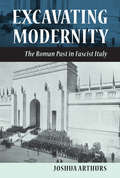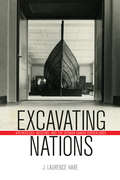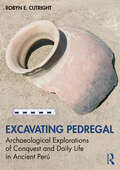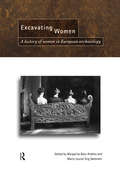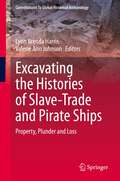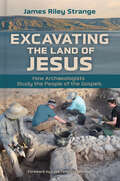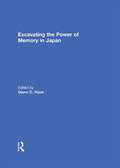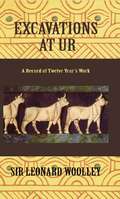- Table View
- List View
Ex-Combatants’ Voices: Transitioning from War to Peace in Northern Ireland, South Africa and Sri Lanka (Palgrave Studies in Compromise after Conflict)
by John D. Brewer Azrini WahidinThis book develops the discourse on the experiences of ex-combatants and their transition from war to peace, from the perspective of scholars across disciplines. Ex-combatants are often overlooked and ignored in the post-conflict search for memory and understanding, resulting in their voice being excluded or distorted. This collection seeks to disclose something of the lived experience of ex-combatants who have made the transition from war to peace to help to understand some of the difficulties they have encountered in social and emotional reintegration in the wake of combat. These include: motivations and mobilizations to participation in military struggle; the material difficulties experienced in social reintegration after the war; the emotional legacies of conflict; the discourses they utilize to reconcile their past in a society moving forward from conflict toward peace; and ex-combatants’ subsequent engagement – or not – in peacebuilding. It also examines the contributions that former combatants have made to post-conflict compromise, reconciliation and peacebuilding. It focusses on male non-state actors, women, child soldiers and, unusually, state veterans, and complements previous volumes which captured the voices of victims in Northern Ireland, South Africa and Sri Lanka. This volume speaks to those working in the areas of sociology, criminology, security studies, politics, and international relations, and professionals working in social justice and human rights NGOs.
Ex-Gay No Way: Survival and Recovery from Religious Abuse
by Jallen RixBringing to light an extreme fundamentalist Christian view, this insider's perspective offers hope to people grappling with the aftereffects of a cult-like movement often known as "Reparative Therapy." The movement assumes that going from gay to straight is easily changeable and change-worthy, despite decades of psycho/sexual research to the contrary. Although it did not succeed in making the author-a Southern Baptist who attended an ex-gay ministry at a young age-straight, it did undermine his self-esteem and confuse him significantly, thus leading him to pursue an advanced degree in sexology in order to help others in similar positions. Offering a detailed comparison of the ex-gay world and the phenomenon known as Religious Abuse, this manual shares a personal journey through the hopeless mistreatment and manipulative system of ex-gay ministries and the recovery process involved in regaining strength, acceptance, and self-worth.
Ex-Gay Research: Analyzing the Spitzer Study and Its Relation to Science, Religion, Politics, and Culture
by Jack Drescher Kenneth J ZuckerDefenders and critics of the controversial Spitzer study analyze its methodologies and findingsIn 2001, Robert L. Spitzer, MD, presented his study on sexual conversion therapy with its controversial findings that some homosexuals can change their sexual orientation. The resulting media sensation and political firestorm enraged the study&’s critics and emboldened its supporters. Ex-Gay Research: Analyzing the Spitzer Study and Its Relation to Science, Religion, Politics, and Culture presents leading experts examining Spitzer&’s research methodology and findings to discern whether the study itself deserves deeper consideration or outright dismissal. Every facet of the study is reviewed to discuss the positive or negative aspects of the results, its significance in political and social terms, and the implications for the future. Dr. Spitzer himself was an instrumental figure in the American Psychiatric Association's decision in 1973 to remove homosexuality as a mental illness listing from the Diagnostic and Statistical Manual-III. His later study that states that in some individuals, homosexuality may be more fluid than previously thought stirred controversy in the psychiatric community and society at large. His study is presented here to allow the reader to evaluate and consider it for themselves. Leading experts then voice their own pro or con views on the methodology and findings. Ex-Gay Research: Analyzing the Spitzer Study and Its Relation to Science, Religion, Politics, and Culture fearlessly illustrates the sometimes fuzzy boundary between science and politics, courageously spotlighting the culture wars now dividing our society.Ex-Gay Research: Analyzing the Spitzer Study and Its Relation to Science, Religion, Politics, and Culture discusses: the ex-gay movement the nature of scientific inquiry the relationship between science and politics the results of sexual conversion therapies gay and lesbian rightsEx-Gay Research: Analyzing the Spitzer Study and Its Relation to Science, Religion, Politics, and Culture is essential reading for sex researchers, mental health professionals, pastoral counselors, political activists, and any person asking if one can truly "change" his or her homosexuality.
Ex-Partner Stalking and Children: The Impact on Children When One Parent is Stalking the Other (Psycho-Criminology of Crime, Mental Health, and the Law)
by Heng Choon Oliver Chan Merja Laitinen Anna NikupeteriPROVIDES AN AUTHORITATIVE OVERVIEW OF STALKING BEHAVIOR PERPETRATED BY PARENTS AND ITS IMPACTS ON CHILDREN Stalking targeted at one of the child’s parents by the other poses a major psychosocial and physical threat to children’s wellbeing and security. Although interdisciplinary research on stalking has expanded in recent decades, intimate partner/ex-partner stalking has been viewed as an “adults only” problem. Ex-Partner Stalking and Children brings together scholars and practitioners from different disciplines in the field to examine ex-partner stalking as a psychosocial and criminological issue in children’s and young people’s lives. Providing both theoretical and practical perspectives, this comprehensive volume explores approaches for increasing awareness of parental stalking, addressing its impacts on children and young people, and advancing interventions and methods of support for them. Throughout the text, the authors challenge existing conceptions of intimate partner/ex-partner stalking as a phenomenon that exists only between the partners, rather than a form of gendered violence that creates a victimizing environment for the children. A novel contribution to both scholarly and practical understandings of ex-partner stalking, this important book: Addresses a gap in knowledge on the socially, ethically, and legally challenging phenomenon of cases when one parent is stalking the otherOffers insights and tools to help practitioners better recognize, support, and intervene in parental stalking situations involving childrenExamines research findings on stalking behavior, including psychological and trauma perspectivesDiscusses best practices and working methods, challenges in identifying the child’s experiences, and factors preventing children from receiving helpRecommends future directions in promoting children’s and young people’s rights in ex-partner stalking Part of the acclaimed Psycho-Criminology of Crime, Mental Health, and the Law series, Ex-Partner Stalking and Children: The Impact on Children When One Parent is Stalking the Other is essential reading for undergraduate and graduate students in disciplines such as criminology, social work, healthcare, psychology, and education, and an invaluable resource for law enforcement staff, nurses, psychologists, therapists, social workers, teachers, and other professionals who work with victims of stalking.
Ex-Soviets in Israel: From Personal Narratives to a Group Portrait
by Larisa Fialkova Maria YelenevskayaA groundbreaking study of personal stories from ex-Soviet immigrants in Israel, bringing together scholarship in anthropology, sociology, linguistics, semiotics, and social psychology.
Exactly What I Said: Translating Words and Worlds
by Elizabeth Yeoman“You don’t have to use the exact same words.… But it has to mean exactly what I said.” Thus began the ten-year collaboration between Innu elder and activist Tshaukuesh Elizabeth Penashue and Memorial University professor Elizabeth Yeoman that produced the celebrated Nitinikiau Innusi: I Keep the Land Alive, an English-language edition of Penashue’s journals, originally written in Innu-aimun during her decades of struggle for Innu sovereignty. Exactly What I Said: Translating Words and Worlds reflects on that collaboration and what Yeoman learned from it. It is about naming, mapping, and storytelling; about photographs, collaborative authorship, and voice; about walking together on the land and what can be learned along the way. Combining theory with personal narrative, Yeoman weaves together ideas, memories, and experiences––of home and place, of stories and songs, of looking and listening––to interrogate the challenges and ethics of translation. Examining what it means to relate whole worlds across the boundaries of language, culture, and history, Exactly What I Said offers an accessible, engaging reflection on respectful and responsible translation and collaboration.
Exalted Subjects
by Sunera ThobaniQuestions of national identity, indigenous rights, citizenship, and migration have acquired unprecedented relevance in this age of globalization. In Exalted Subjects, noted feminist scholar Sunera Thobani examines the meanings and complexities of these questions in a Canadian context. Based in the theoretical traditions of political economy and cultural / post-colonial studies, this book examines how the national subject has been conceptualized in Canada at particular historical junctures, and how state policies and popular practices have exalted certain subjects over others.Foregrounding the concept of 'race' as a critical relation of power, Thobani examines how processes of racialization contribute to sustaining and replenishing the politics of nation formation and national subjectivity. She challenges the popular notion that the significance of racialized practices in Canada has declined in the post Second World War period, and traces key continuities and discontinuities in these practices from Confederation into the present. Drawing on historical sociology and discursive analyses, Thobani examines how the state seeks to 'fix' and 'stabilize' its subjects in relation to the nation's 'others.' A controversial, ground-breaking study, Exalted Subjects makes a major contribution to our understanding of the racialized and gendered underpinnings of both nation and subject formation.
Examining Intelligence-Led Policing
by Adrian JamesForeword from Professor Emeritus Robert Reiner, London School of Economics, UK. This book provides a critical examination of intelligence-led policing strategies, including an investigation of innovative strategies such as Problem Oriented Policing (POP), problem-solving, and community policing, and in-depth analyses of the Kent Policing Model, which became the template for ILP models across the world, and the UK's National Intelligence Model (NIM). Intelligence-led policing (ILP) approaches have proved particularly attractive to senior police officers and policymakers because they promise to deliver more efficient and effective solutions to the problems of crime than traditional policing practices. However, this book shows that these approaches have delivered far less than their supporters would have us to believe. In part, this has been because of what James terms as 'police orthodoxy'. However, this cannot wholly explain the relative failure of ILP in Britain and elsewhere in the developed world. Drawing on a range of material including extensive interviews with key NIM figures including ACPO members, senior police managers, intelligence workers, police detectives and staff, James questions to what extent British policing can truly be said to be intelligence-led, and whether there is a popular mandate for an alternative to traditional Peelian practice, where police aim simply to deliver intelligent rather than intelligence-led policing. The book provides important insights into the debate on intelligence-led policing and the mechanics and politics of policy development. As such it will be of great value within the policing sphere and more broadly for public policy studies.
Examining Japan's Lost Decades (Routledge Contemporary Japan Series)
by Yoichi Funabashi Barak KushnerThis book examines five features of Japan’s ‘Lost Decades’: the speed of the economic decline in Japan compared to Japan’s earlier global prowess; a rapidly declining population; considerable political instability and failed reform attempts; shifting balances of power in the region and changing relations with Asian neighbouring nations; and the lingering legacy of World War Two. Addressing the question of why the decades were lost, this book offers 15 new perspectives ranging from economics to ideology and beyond. Investigating problems such as the risk-averse behaviour of Japan’s bureaucracy and the absence of strong political leadership, the authors analyse how the delay of ‘loss-cutting policies’ led to the 1997 financial crisis and a state of political gridlock where policymakers could not decide on firm strategies that would benefit national interests. To discuss the rebuilding of Japan, the authors argue that it is first essential to critically examine Japan’s ‘Lost Decades’ and this book offers a comprehensive overview of Japan’s recent 20 years of crisis. The book reveals that the ‘Lost Decades’ is not an issue unique to the Japanese context but has global relevance, and its study can provide important insights into challenges being faced in other mature economies. With chapters written by some of the world’s leading Japan specialists and chapters focusing on a variety of disciplines, this book will be of interest to students and scholars in the areas of Japan studies, Politics, International Relations, Security Studies, Government Policy and History.
Examining Lorraine Hansberry’s A Raisin in the Sun as Counternarrative: Understanding the Black Family and Black Students
by Carl A. GrantExamining Lorraine Hansberry’s A Raisin in the Sun as Counternarrative: Understanding the Black Family and Black Students shows how and why Lorraine Hansberry’s play, A Raisin in the Sun, should be used as a teaching tool to help educators develop a more accurate and authentic understanding of the Black Family. The purpose of this book is to help educators develop a greater awareness of Black children and youth’s, humanity, academic potential and learning capacity, and for teachers to develop the consciousness to disavow white supremacy, American exceptionalism, myths, racial innocence, and personal absolution within the education system. This counternarrative responds to the flawed and racist perceptions, stereotypes, and tropes that are perpetuated in schools and society about the African American family and Black students in US schools. It is deliberative and reverberating in addressing anti-Black racism. It argues that, if Education is to be reimagined through a social justice structure, teachers must be educated with works that include Black artists and educators, and teachers must be committed to decolonizing their own minds. Examining Lorraine Hansberry’s A Raisin in the Sun as Counternarrative: Understanding the Black Family and Black Students is important reading for undergraduate and postgraduate courses in Educational Foundations, Curriculum and Instruction, Education Policy, Multicultural Education, Social Justice Education, and Black Studies. It will also be beneficial reading for in-service educators.
Examining Political Violence: Studies of Terrorism, Counterterrorism, and Internal War (International Police Executive Symposium Co-Publications)
by David Lowe Dilip K. Das Austin TurkA collection of works, some previously published as articles in the journal Police Practice and Research, this book provides both conceptual analysis and case studies, exploring historical and sociopolitical contexts of conflicts in order to help readers better understand these themes. The book defines the concepts of terrorism and radicalization, discusses countering terrorism through intelligence gathering, and examines different policing models. The conclusions drawn from these findings may assist in combating terrorism and political violence around the world. This book is a co-publication with the International Police Executive Symposium (IPES).
Examining Subjectivity with Q Methodology
by Susan RamloThis innovative book explores how Q methodology offers a unique way to examine subjectivity, meaning people’s viewpoints, in that it both differentiates and describes viewpoints, by blending qualitative and quantitative research methods. The book provides accurate terminology and consistent practices, with examples of using Q to study subjectivity in a variety of contexts and disciplines. The book also frames Q with its unique blending of qualitative and quantitative research aspects, from data collection to analysis and interpretation. The author aims to help readers to understand the basics of Q methodology as well as delving deeper into Q as explicated by William Stephenson in an easy to read yet accurate text in terms of processes and theoretical frameworks of Q.This is an essential text for those interested in using Q methodology in qualitative research and mixed methods research across a range of disciplines.
Examining Tuskegee
by Susan M. ReverbyThe forty-year "Tuskegee" Syphilis Study has becometheAmerican metaphor for medical racism, government malfeasance, and physician arrogance. The subject of histories, films, rumors, and political slogans, it received an official federal apology from President Bill Clinton in a White House ceremony. Susan M. Reverby offers a comprehensive analysis of the notorious study of untreated syphilis, which took place in and around Tuskegee, Alabama, from the 1930s through the 1970s. The study involved hundreds of African American men, most of whom were told by doctors from the U. S. Public Health Service that they were being treated, not just watched, for their late-stage syphilis. Reverby examines the study and its aftermath from multiple perspectives to explain what happened and why the study has such power in our collective memory. She follows the study's repercussions in facts and fictions. Reverby highlights the many uncertainties that dogged the study during its four decades and explores the newly available medical records. She uncovers the different ways it was understood by the men, their families, and health care professionals, ultimately revising conventional wisdom on the study. Writing with rigor and clarity, Reverby illuminates the events and aftermath of the study and sheds light on the complex knot of trust, betrayal, and belief that keeps this study alive in our cultural and political lives.
Examining and Mitigating Sexual Misconduct in Sport
by Tanya Prewitt-White Leslee A. FisherSexual Misconduct in any environment is a gross abuse of trust and this is no different within the sport world. Examining and Mitigating Sexual Misconduct in Sport outlines systemic and sociological explanations for why sport is a site of sexual misconduct. The authors in the text describe cultural realities and considerations sport stakeholders must acknowledge and be informed of to make sport a more equitable and safe space. Personal narratives from a variety of sport stakeholders, which unveil their lived experiences of sexual misconduct and humanize survivor stories in ways often ignored in sport and society, are shared. Authors offer recommendations to all sport stakeholders to mitigate incidents of and harm done by sexual misconduct. Guidelines and suggestions for sport stakeholder practices that better protect individuals in sport, address sexual misconduct when it occurs, and mitigate the harm and trauma experienced because of incidents of sexual misconduct are also examined and provided. This book is the first text of its kind to invite sport stakeholders to have open, vulnerable, and honest discussions around a timely topic often minimized, denied and/or ignored in sport. A ground-breaking new book, Examining and Mitigating Sexual Misconduct in Sport is key reading for any sport coach, sport parent, sport psychology professional, or sport administrator.
Examining the Intersection of Incel and Crypto Bro Phenomena: A Linguistic Qualitative Study of Harmful Ideologies in Cryptocurrency-Focused Communities (BestMasters)
by Victoria KozlovaThis book addresses the issue of gender underrepresentation in the cryptocurrency domain. This thesis attributes it to the presence of unwelcoming and hostile communities around it. Grounded in the frameworks of feminist technoscience and situated knowledge, this research explores the linguistic landscape of these communities. Employing observational netnography and keyword search methodologies, the utilisation of incel-specific linguistic repertoire in cryptocurrency-focused discussions is uncovered on platforms like Discord. While the mere use of these terms doesn't directly link cryptocurrency enthusiasts to the incel community, their widespread adoption and normalisation can perpetuate harmful stereotypes and discourage individuals who don't align with such ideologies from participating. The aim of this thesis is to raise awareness about potential barriers created by often questionable linguistic choices.
Examining the Relationship between Trauma and Addiction
by Shelly A. Wiechelt and Shulamith Lala A. StraussnerTrauma, trauma-related disorders, substance use, and addictive disorders often co-occur, and frequently play a role in the problems and issues that social workers contend with in their practice with individuals, families, and communities. Research shows that there is a relationship between trauma-related symptoms and problematic use of substances and other addictive behaviors. Individuals who experience these co-occurring problems have better outcomes when their issues are addressed with integrated treatment approaches. Trauma-informed care and trauma-specific treatment are therefore important components of effective social work interventions.This book examines various types of trauma, such as intergenerational trauma, adverse childhood events, childhood sexual abuse, and minority stress, amongst various populations and settings, including Native Americans, homeless youth, drug court participants, and LGB adolescents. It also explores the challenges in delivering trauma services in outpatient addiction treatment settings. Furthermore, it provides practical information on how to implement trauma-informed approaches in addiction treatment, and offers insights into the experience of a trauma survivor who is also recovering from a substance use disorder. This book was originally published as a special issue of the Journal of Social Work Practice in the Addictions.
Excavating Jesus: Beneath the Stones, Behind the Texts
by Jonathan L. Reed John Dominic CrossanJesus scholar and archeologist combine to look at life of Jesus.
Excavating Modernity: The Roman Past in Fascist Italy
by Joshua ArthursThe cultural and material legacies of the Roman Republic and Empire in evidence throughout Rome have made it the "Eternal City." Too often, however, this patrimony has caused Rome to be seen as static and antique, insulated from the transformations of the modern world. In Excavating Modernity, Joshua Arthurs dramatically revises this perception, arguing that as both place and idea, Rome was strongly shaped by a radical vision of modernity imposed by Mussolini's regime between the two world wars.Italian Fascism's appropriation of the Roman past-the idea of Rome, or romanità- encapsulated the Fascist virtues of discipline, hierarchy, and order; the Fascist "new man" was modeled on the Roman legionary, the epitome of the virile citizen-soldier. This vision of modernity also transcended Italy's borders, with the Roman Empire providing a foundation for Fascism's own vision of Mediterranean domination and a European New Order. At the same time, romanità also served as a vocabulary of anxiety about modernity. Fears of population decline, racial degeneration and revolution were mapped onto the barbarian invasions and the fall of Rome. Offering a critical assessment of romanità and its effects, Arthurs explores the ways in which academics, officials, and ideologues approached Rome not as a site of distant glories but as a blueprint for contemporary life, a source of dynamic values to shape the present and future.
Excavating Nations
by J. Laurence HareExcavating Nations traces the history of archaeology and museums in the contested German-Danish borderlands from the emergence of antiquarianism in the early nineteenth-century to German-Danish reconciliation after the Second World War. J. Laurence Hare reveals how the border regions of Schleswig-Holstein and Sønderjylland were critical both to the emergence of professional prehistoric archaeology and to conceptions of German and Scandinavian origins.At the center of this process, Hare argues, was a cohort of amateur antiquarians and archaeologists who collaborated across the border to investigate the ancient past but were also complicit in its appropriation for nationalist ends. Excavating Nations follows the development of this cross-border network over four generations, through the unification of Germany and two world wars. Using correspondence and site reports from museum, university, and state archives across Germany and Denmark, Hare shows how these scholars negotiated their simultaneous involvement in nation-building projects and in a transnational academic community.
Excavating Pedregal: Archaeological Explorations of Conquest and Daily Life in Ancient Perú
by Robyn E. CutrightExcavating Pedregal offers a new synthesis of household-level experiences of imperial conquest on the north coast of Perú, using excavations at the Late Intermediate Period farming community of Pedregal as an engaging case study of archaeological research in action. Alongside this central case study, short essays by other archaeological stakeholders highlight diverse experiences and perspectives within archaeology.This book draws on the author’s 15 years of experience teaching undergraduates and over 20 years as an archaeologist in Perú to offer an accessible account of how archaeological research happens. Chapters introduce key concepts from anthropological archaeology and link research questions to methods, data analysis, and findings. The book balances a discussion of the scientific processes and anthropological theories that ground archaeological research with a tangible account of the lived experiences and practical considerations of doing archaeology. Excavating Pedregal’s multivocal approach complements the central case study with vignettes by North American and Latin American archaeologists, students, and community members. These short essays enrich the main themes of the book and introduce readers to different perspectives and voices within the field, highlighting the way collaboration and conversation with multiple stakeholders enhance the study of the past.Excavating Pedregal is an approachable introduction to how archaeology works for undergraduate students and general readers. It supplements a traditional introductory text by contextualizing research questions, methods, and data in a concrete, contemporary case study while also offering a sense of the diversity of questions, experiences, and methods that exist in archaeology today and satisfying the curiosity of those who wonder what it’s like to dig up the past.
Excavating Women: A History of Women in European Archaeology
by Marie Louise Stig Sørensen Margarita Díaz-AndreuArchaeologists are increasingly aware of issues of gender when studying past societies; women are becoming better represented within the discipline and are attaining top academic posts. However, until now there has been no study undertaken of the history of women in European archaeology and their contribution to the development of the discipline. Excavating Women discusses the careers of women archaeologists such as Dorothy Garrod, Hanna Rydh and Marija Gimbutas, who against all odds became famous, as well as the many lesser-known personalities who did important archaeological work. The collection spans the earliest days of archaeology as a discipline to the present, telling the stories of women from Scandinavia, Mediterranean Europe, Britain, France, Germany and Poland. The chapters examine women's contributions to archaeology in the context of other, often socio-political, factors that affected their lives. It examines issues such as women's increased involvement in archaeological work during and after the two World Wars, and why so many women found it more acceptable to work outside of their native lands. This critical assessment of women in archaeology makes a major contribution to the history of archaeology. It reveals how selective the archaeological world has been in recognizing the contributions of those who have shaped its discipline, and how it has been particularly inclined to ignore the achievements of women archaeologists. Excavating Women is essential reading for all students, teachers and researchers in archaeology who are interested in the history of their discipline and its sociopolitics.
Excavating the Histories of Slave-Trade and Pirate Ships: Property, Plunder and Loss (Contributions To Global Historical Archaeology)
by Lynn Brenda Harris Valerie Ann JohnsonThis edited volume brings new perspectives on the topic maritime archaeology of the slave trade in the Caribbean. The book focuses on shipwrecks of the slave trade in the 18th century and suggests that there is a more complex and challenging social narrative than has previously been discussed. The authors examine biographies of ships, crew members, voyage logs, cargo inventories, trader correspondence and contextual analysis of the artifact assemblages to bring new insights into the microeconomics and maritime traditions of these floating prisons. The illustrious biography of Captain Edward Thache (aka Blackbeard) reveals past identities as a naval officer, slave trader, and pirate. Categories of artifacts in archaeological collections represent cultural connections and traditions of enslaved Africans. The volume includes several case studies that inform these narratives and examines slave ships such as la Concorde, Henrietta Marie, Whydah, La Marie Seraphique and Marquis de Bouillé. Within the larger context of slave trade during the 18th century, authors explore legal and illegal trade in the British West Indies. These studies also address the plethora of social, political, and environmental impacts on these island communities that played an integral and strategic role in slave trade economics. This volume presents up-to-date research of professional maritime historians, artifact curators, and marine archaeologists drawing upon primary source documents, artwork, and material culture. The research collaborators reconstruct the international spheres of colonial North America, Europe, Africa, and West Indies. It is an interwoven narrative, both unique and typical, to the social and economic dynamics of 18th century Atlantic World.
Excavating the Land of Jesus: How Archaeologists Study the People of the Gospels
by James Riley StrangeHow do archaeologists unearth the daily life of people from Jesus&’s time?Contrary to popular belief, archaeology of first-century Roman Galilee is not about illustrating or proving the gospels, drawing timelines, or hunting treasure. Rather, it is about understanding the lives of people, just like us, who lived in the time of Jesus. How do we conceive of Jesus and his mission as part of a larger world? How did different groups in Roman Galilee understand their identities and values? How do we interpret material culture in conjunction with textual evidence from the gospels? On a more basic level, how do we know where and how to dig?James Riley Strange teaches students how to address these problems in Excavating the Land of Jesus. Drawing on professional experience as a scientific archaeologist in Israel, Strange explains current methodology for ground surveying, excavating evidence, and interpreting data. Excavating the Land of Jesus is the ideal textbook for students seeking answers in the dirt of the Holy Land.
Excavating the Power of Memory in Japan
by Glenn D. HookExcavating the power of memory offers a succinct examination of how memory is constructed, embedded and disseminated in contemporary Japanese society. The unique range and perspective of this collection will provide an understanding not found elsewhere. It starts with a lucid introduction of how memory plays a political and wider social role in Japan. Four case studies follow. The first takes up the divergence in memory at the national and subnational levels by analysing the memory of the battle of Okinawa and US military accidents in Okinawa prefecture, illuminating how memory in the prefecture embeds Okinawans as victims of mainland Japan and of the United States. The second explores whether Japan’s membership of the International Criminal Court represents a shift in the Japanese government’s negative remembrance of the International Military Tribunal for the Far East, demonstrating how both courts are largely portrayed as being disconnected in political debates. The third offers an analysis of the surviving letters of the Kamikaze pilots in order to interrogate and compare their presumed identity in the dominant collective memory and their own self-identities. The fourth untangles how the ‘memory of winds’ in Japanese fishing communities remains an expression of social thought that presides over the ‘transmission of meaning’ about fishermen's geographical surroundings. This book was previously published as a special issue of the Japan Forum.
Excavations At Ur
by WoolleyFirst published in 2010. Routledge is an imprint of Taylor & Francis, an informa company.
